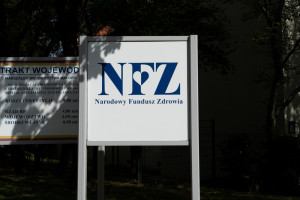Genetic testing at the clinic. The National Health Fund is planning an important change in oncology

- Experts have long been calling for the possibility of performing genetic tests from peripheral blood in patients with BRCA-dependent cancers on an outpatient basis, without the need for hospitalization.
- The draft regulation of the President of the National Health Fund, currently in consultation, states that advanced genetic diagnostics, i.e. testing for BRCA 1/2 mutations using the next-generation sequencing (NGS) method, will still require the patient to be admitted to hospital.
- Under the AOS, only studies from the basic and complex research baskets would be possible, in the case of qualification for one of the four drug programs dedicated to patients with BRCA-dependent cancers: breast, ovarian, pancreatic or prostate cancer.
- These tests would be reimbursed only for patients with confirmed mutations and who additionally meet all other criteria for qualifying for the drug program.
Experts have long been calling for the possibility of performing genetic tests from peripheral blood on an outpatient basis, without the need for hospitalization. During the conference of the Polish Coalition for Personalized Medicine, Deputy Minister of Health Urszula Demkow announced that this will be possible from July 1 this year, and the financing will include, among others, tests for BRCA1/2, i.e. genes key in the diagnosis of ovarian, breast, prostate and pancreatic cancer.
Detecting these mutations is of great importance to patients, as it means they can qualify for modern targeted therapies that significantly improve treatment outcomes. For now, the method of financing that limits access to genetic diagnostics reduces the chances of cancer patients to prolong their survival and improve its quality.
Hospitals are also experiencing difficulties. The current structure of payments makes it impossible to finance outpatient tests, which is why facilities are forced to provide one-day hospitalizations. This involves staff who are in short supply and takes them away from other tasks they should be performing. This "waste" work also causes additional costs for the system, related to unnecessary hospitalizations.
Draft regulation in consultation. What does the payer propose?Will the hopes placed in Deputy Minister Demkow's announcement be fulfilled? The question is open. It is related to the currently consulted draft regulation of the President of the National Health Fund amending the regulation on determining the conditions for concluding and implementing contracts such as hospital treatment and hospital treatment - highly specialized services.
According to the project published on the Fund's website on June 16, advanced genetic diagnostics, i.e. testing for BRCA 1/2 mutations using the next-generation sequencing (NGS) method, will continue to require the patient to be admitted to hospital . The possibility of performing these tests under AOS would only apply to tests from the basic and complex test baskets, but does not include the advanced test basket, which includes NGS.
Additionally, these tests could be performed on an outpatient basis only in the case of qualification for one of the four drug programs dedicated to patients with BRCA-dependent cancers: breast, ovarian, pancreatic or prostate cancer.
Another issue that draws attention in the draft regulation is the payer's proposed method of settling basic and complex peripheral blood tests for BRCA 1/2 in outpatient mode. As it results from the draft, these tests would be reimbursed only for patients in whom the mutation has been confirmed and who additionally meet all other criteria for qualifying for the drug program .
The battle has been going on for a long timeThe National Health Fund will not pay for tests of patients in whom the mutation has not been confirmed or has been confirmed but does not meet any of the criteria for qualifying for the program.
As Dr. hab. Beata Jagielska , chairwoman of the National Oncology Council, director of the National Institute of Oncology – State Research Institute in Warsaw, said during a meeting devoted to diagnostics in the National Oncology Network, the battle for the possibility of performing and settling molecular tests for BRCA-dependent cancers at the outpatient level has been going on for a long time, and the Coalition for Personalized Medicine has repeatedly addressed this matter to the Ministry of Health.
The NIO-PIB Director explained that, in the opinion of the Ministry of Health, separately contracted services are a sufficient solution to the problem of access to these tests. According to experts, however, this is absolutely not enough, among other things due to inadequate pricing.
- The other side of the problem with molecular testing is healthcare providers. The degree of utilization of molecular diagnostics possibilities that are already available is very low. Additionally, the patient waits up to 2-2.5 months to receive the result and start treatment. Not all patients are also subjected to this diagnostics. Although all patients with ovarian cancer should be tested for BRCA1/2 mutations, the percentage of those tested is small - emphasized dr hab. Beata Jagielska.
- It should also be recalled that 100% of a given population should be diagnosed, because it is not known who will be diagnosed with a given molecular abnormality. This principle must apply regardless of the method of financing adopted - she added.
A fourth basket is neededAs Dr. Andrzej Tysarowski , head of the NIO-PIB Cancer Genetic and Molecular Diagnostics Department, said in an interview with Rynek Zdrowia, there are currently two basic problems. One concerns the possibility of performing genetic tests from fresh material as part of an outpatient visit, and this is not about genetic counseling, but about genetic tests related to treatment.
- This is a much-needed change in BRCA-dependent cancers, e.g. in breast cancer, where we have about 20,000 diagnoses per year, but also in pancreatic cancer, among others - he pointed out.
The second issue, he said, concerns comprehensive genomic profiling, which was not yet available in 2017, when the current genetic testing settlement system was created. Therefore, the three existing research baskets: basic, complex and advanced, should be supplemented with a fourth basket – comprehensive genomic profiling.
The expert noted that such a test is required for a specific indication, such as ovarian cancer. We are talking about the so-called genomic signature, which allows, apart from BRCA 1/2 mutations, to qualify patients for targeted treatment. This also applies to lung cancer, where the use of this technology will soon be required when making therapeutic decisions.
According to experts, the best solution would be to check whether the diagnostics that determine the use of this drug are financed and at what level its financing remains when a new drug is introduced. It must be adequate to the needs resulting from the dynamic development of oncology.
Copyrighted material - reprint rules are specified in the regulations .
rynekzdrowia













